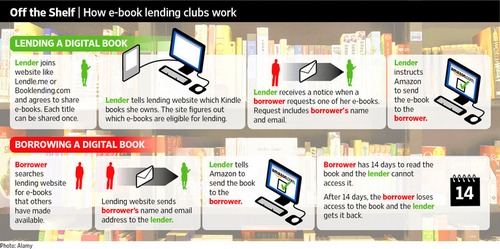Barnes and Noble and Amazon during the last few years developed eBook lending programs that authors and publishers can opt into. This system allowed ebooks to be flagged lending enabled and select books could be loaned out to a friend and family member for up to two weeks, only once. Many people find that they don’t have the same taste as their friends or are the only one in their social circle with an e-reader. This common situation gave rise to eBook lending websites such as Lendle, LendingeBook, eBook Fling and many others. These sites specialized in facilitating relationships between people who bought books and are looking to share them. Some of the sites did very well, but are now seeing very diminished market share. Is Amazon Prime responsible for killing eBook Lending Clubs?
When eBook Lending websites first burst on the scene with the website Kindle Lending. This was a fairly massive community that orientated from the Amazon forums, but their days were numbered. Amazon came down hard on the developers and made them change their name, because of trademark infringement. Within a few months the website had lost the majority of their traffic and the public was led to believe they were shut down by Amazon. The website Booklending is still around and continues to be the market leader, but with no advertising, it is losing more users then gaining.
Lendle was another popular eBook Lending website that had been around for a number of years. The developers saw the writing on the wall and decided to sell their website for six figures last May. It seems they couldn’t find any takers and the main website just seems to be floundering away with no new features. A number of other companies such as LendingeBook, and eBook Fling launched in the last few years and have a steady stream of users taking advantage of their services, but are steadily losing ground.
Amazon Prime for eBooks was released in November 2011, around the same time most of the lending websites started experiencing problems. Amazon allows people who pay the $70 annual fee to have access to one free eBook a month. Authors actually make money when people borrow their books for free via Amazon, and make nothing when their book is shared between friends on book lending websites. This obviously is in an authors best interest to promote the fact their book is on Prime, because in many cases, lending your book out for free makes you more money then selling it for .99.
The one problem with most eBook lending websites is that there is only a few copies of the most popular books, at any given time. The entire lending system was developed so that once a book was loaned out once, it can never be lent out again. Many users are obviously gravitating towards Amazon Prime and the book lending sites are not seeing enough new blood being added to make up for all the best books expiring off their system. Prime books are basically infinite, and millions of users can borrow the same book if they wanted to.
One of the big factors on why Prime is attracting a healthier user popular is because of the sheer number of mainstream titles in its library. Most publishers opt out of book lending and major franchises don’t participate. This insures the most varied selection is on Prime, instead of the book lending sites.
eBook Lending overall has a negative stigma that is hard to overcome. Case and point was with the newest eBook Lending site to start-up, Lendink. It attracted a fair amount of attention in a short period of time because many uninformed authors saw their books on the website and accused it of piracy. Angry mothers and indie authors waged a war on Facebook, Twitter and other social media outlets to destroy the site. This prompted many DMCA notices being sent to their web-host and ultimately resulted in them being shut down. Lendink did not do anything differently then any of the other major eBook Lending websites, but was a victim of the times.
Between Amazon Prime and the surge in libraries allowing patrons to borrow digital books for free from their local library, book lending websites are on the ropes. Most of these companies have zero marketing and do not really promote their companies, and are quickly fading away into obscurity. Prime basically killed book lending websites, because Amazon dominates the eBook market. As much as people want to consider Barnes and Noble a major factor in the eBook industry, they are relegated to a fairly small overall market share.
Amazon Prime killed eBook lending websites. Most of the owners of the biggest sites have publicly stated that their business model is not sustainable in today’s market climate. The vast majority don’t charge users money for access and only make a pittance with affillite sales via Amazon. In some cases Amazon cuts these sites affillite programs off, without warning. Most people want to get out, but no one is buying.
Michael Kozlowski is the editor-in-chief at Good e-Reader and has written about audiobooks and e-readers for the past fifteen years. Newspapers and websites such as the CBC, CNET, Engadget, Huffington Post and the New York Times have picked up his articles. He Lives in Vancouver, British Columbia, Canada.
